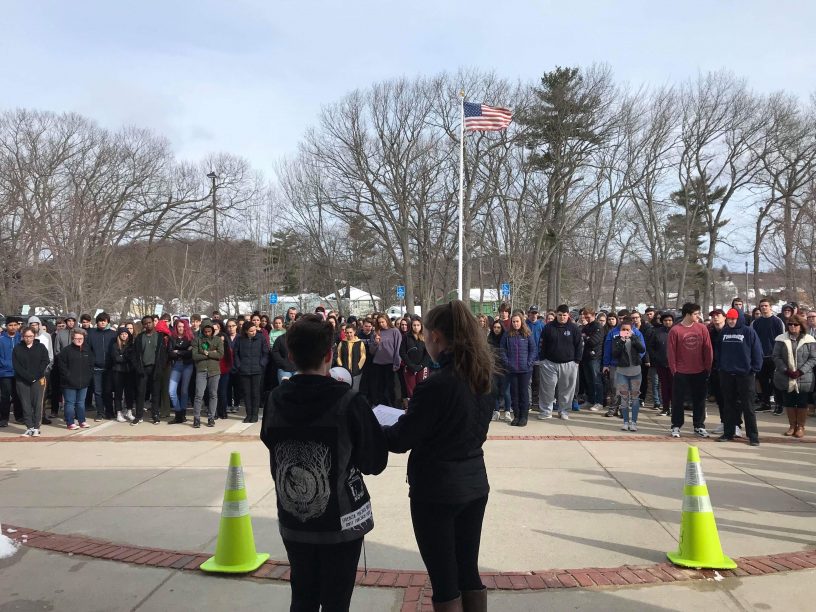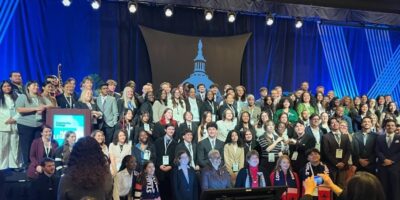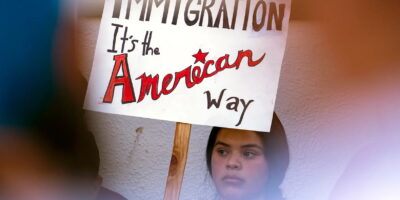Baby Boomers and even Gen X-ers on both sides of the political aisle may have felt a bit embarrassed this week when former Vice President Joe Biden and President Donald Trump exchanged schoolyard taunts with each other.
Speaking to a group of students at an anti-sexual assault rally at the University of Miami and referring to comments Trump made in a 2005 “Access Hollywood” tape about grabbing women without their permission, Biden said that if he and Trump “were in high school, I’d take him behind the gym and beat the hell out of him.”
Trump then responded with a tweet saying that if they scrapped, “Crazy Joe Biden…would go down fast and hard, crying all the way.”
I’m not sure who might actually come out on top in that septuagenarian scuffle, but either way, it doesn’t seem like it would raise the level of public discourse much; or inspire the next generation of leaders toward noble actions for the common good.
If that’s what you’re looking for—hope for civic engagement and the future leadership of our democracy—then Millennials and Generation Z, and especially anyone still under the age of 20, this was your week to shine.
Yesterday, over half a million people, most of them teenagers, gathered on the National Mall in Washington, D.C. for the March for Our Lives, while millions more assembled for “sibling marches” in over 800 cities around the world, including Boston.
March for Our Lives has grown largely out of the efforts of students from Marjory Stoneman Douglas High School who survived the February 14 mass shooting that claimed 17 young lives.
Several of those students have become spokespeople for the movement, which is being compared to the Birmingham Children’s Crusade civil rights march of 1963.
Then, as now, public opinion over the various issues young people were marching for was divided.
But, however you may feel about gun control, the Second Amendment, mental health services, and the host of other hot button topics at the heart of this march, there is a lot to admire about the preparedness, poise, and persistence of these young leaders.
For example, a couple days ago, in advance of the D.C. event, National Public Radio aired this brief interview with Cameron Kasky, a 17-year-old survivor of the Parkland shooting, and one of the organizers of the march: https://www.npr.org/2018/03/23/596356998/parkland-survivor-on-march-for-our-lives.
No name calling or invitation to meet by the flagpole after school for a brawl. Instead, Mr. Kasky is respectful, but purposeful, as he explains his beliefs and outlines his case.
Abilities like this are crucial for a functioning democracy, so community colleges like NECC take pride in encouraging civic engagement among our students, and including abilities like Global Awareness and Public Presentation among the Core Academic Skills we expect our graduates to demonstrate.
Our Global Studies Department and Contemporary Affairs Club regularly offer special non-partisan events like Election Teach-Ins, presentations on the importance of voting by elected officials; candidate debates; programs on topics such as voter security; and more.
Working with Massachusetts Campus Compact, under the leadership of NECC’s Coordinator of Civic Engagement, Service-Learning, and Community Resources Janel D’Agata Lynch, faculty and staff at Northern Essex created and launched our first comprehensive Civic Engagement Plan last year.
These efforts are successfully encouraging more of our students to volunteer in their communities, engage in civic matters and events, and to express themselves at the ballot box.
NECC students are voting in greater numbers than students at other community colleges and public and private universities around the country, according a recent study of more than 1,000 campuses conducted by the Institute for Democracy & Higher Education at Tufts University.
Just over half of the students at NECC voted in the 2016 election, up 4.5 percent from 2012, and higher than the national average of 50 percent.
As someone who straddles the line between Baby Boomer and Gen X-er, I’m encouraged by what I’m seeing from Millenials and Gen Z around the country, on NECC’s campus, and, closer to home, in my living room.
My own 17-year-old daughter, Thomasina (once known to readers of this blog as “Big Sis T”), is graduating high school soon, finishing her associate’s degree at NECC, and heading off to college.
Still too young to vote, she signed up for pre-registration, as twelve states and the District of Columbia allow, the day she turned sixteen.
She is a budding social justice organizer and activist, with a particular interest in LGBTQIA+ and women’s issues, and more recently, a growing attention to the challenges faced by immigrants in our communities, and to young people feeling endangered in school settings.
Ten days ago, as part of the March 14 National School Walkout, she and a few other young leaders worked with their school superintendent, principal, and teachers to organize their own local walkout.
At their invitation, State Senator Kathleen O’Connor Ives, and State Representative James Kelcourse attended. Local police monitored the entrances to the school to ensure everyone’s safety, and at 10:00 a.m. most of the student body walked out of the school to the front foyer, and held a 17-minute commemoration, one minute for each of the lives lost in the Parkland shooting.
In addition to reading the names and short biographies of each of the slain students, they handed out fliers that encouraged students to register to vote, offered the names and contact information of elected officials they could reach out to and express their opinions, whatever they might be, and provided their own commentary on what they thought the older generation (the one still in charge for a little while longer) should do.
They began:
This is a problem that’s been around since before we became students and little more than thoughts and prayers have been done to fix it.
It’s time that we take our lives into our own hands. Not just our own lives but the lives of the students that will come after us, and the staff that will be here long after we leave.
Then they proceeded to share their own ideas about how to strengthen mental health services, identify students who may be at risk, or risky, more carefully control access to dangerous weapons, and generally make their schools—the places they spend much of their young lives—safer, and more focused on education than survival.
That’s a goal I think we all likely have in common.
And in case the Baby Boomers who once learned to “Never Trust Anybody over 30” and the sandwiched Gen X-ers who trailed along after them have forgotten the vitality and power of youth, the next couple of generations are taking the stage, ready to remind us.






